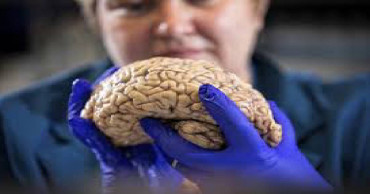Alzheimer
Study reveals why brain inflammation in Alzheimer’s differs from regular infections
A new study has shed light on the differences between how the immune system responds to Alzheimer's-related inflammation compared to infections.
While inflammation is a key immune response, in Alzheimer's disease, it becomes chronic and harmful rather than short-term and protective. Researchers have been working to understand why this prolonged immune reaction occurs.
The findings, presented at the 69th Biophysical Society Annual Meeting in Los Angeles, highlight crucial variations in immune activity when exposed to Alzheimer’s-related proteins versus bacterial infections.
How the immune system reacts
The research focuses on how immune cells respond to amyloid-beta (Ab) plaques, a defining feature of Alzheimer's, and how this differs from their reaction to bacterial toxins. "Bacteria cannot directly enter the brain due to the blood-brain barrier," explained Arpan Dey, PhD, a postdoctoral associate at the University of Cambridge. "However, small proteins might be mimicking bacterial activity in the brain, triggering inflammation that contributes to dementia."
Dey and his colleagues used immune cell models and exposed them to either Ab aggregates or lipopolysaccharide (LPS), a bacterial toxin that strongly activates immune responses. They specifically studied the formation of myddosomes, structures that play a key role in initiating inflammation.
Can sleep position affect your heart and brain health?
Their results showed that larger Ab clusters prompted significant myddosome formation, whereas smaller clusters failed to do so even after prolonged exposure. This suggests that the size of Ab aggregates is a crucial factor in triggering an immune response in Alzheimer’s.
On the other hand, LPS caused a much faster and more intense myddosome reaction than even the largest Ab clumps. This difference in speed and strength may explain why inflammation in Alzheimer’s is persistent and prolonged, whereas infection-related inflammation is typically brief and resolves quickly.
"Our research highlights a fundamental difference in how the brain’s immune system reacts to bacterial infections versus amyloid-beta aggregates," said Dey. "The slower, sustained immune activation in Alzheimer’s may be a key factor in its chronic inflammation."
The researchers now plan to investigate myddosome markers in blood samples from dementia patients and brain tissue from the UK Brain Bank. By uncovering the mechanisms behind Alzheimer’s inflammation, they hope to aid in the development of treatments targeting chronic neuroinflammation.
"This study opens new possibilities for drug discovery," Dey added. "By identifying and targeting inflammatory pathways, we may develop therapies to slow the progression of Alzheimer’s and other neurodegenerative diseases."
Source: with inputs from Indian Media
1 year ago
Alzheimer’s drug approval ‘rife with irregularities’: Probe
The Food and Drug Administration’s contentious approval of a questionable Alzheimer’s drug took another hit Thursday as congressional investigators called the process “rife with irregularities.”
The 18-month investigation by two House committees detailed “atypical collaboration” between FDA regulators and a company it’s supposed to oversee -- Aduhelm manufacturer Biogen. The probe also cited Biogen documents saying the company intended to “make history” when it set what investigators called an “unjustifiably high” initial price of $56,000 a year for the drug.
The criticism comes as the FDA is expected to decide whether to approve another new Alzheimer’s drug in January. Thursday’s report urged the agency to “take swift action” to ensure that any future Alzheimer’s approvals aren’t met with “the same doubts about the integrity of FDA’s review.”
Read more: Drug slows Alzheimer's but can it make a real difference?
The FDA and Biogen issued statements Thursday defending the Aduhelm approval process.
In 2021, the FDA overruled its own independent scientific advisers when it approved Aduhelm even though research studies failed to prove it really helped patients. Biogen had halted two studies after disappointing results suggested the drug wasn’t slowing Alzheimer’s inevitable worsening -- only to later contend that a new analysis of one study showed higher doses offered an incremental benefit.
The FDA argued the drug’s ability to reduce a hallmark of Alzheimer’s, a buildup of plaque in the brain, suggested it was likely to slow the disease. Backlash was immediate as three FDA advisers resigned in protest and the agency’s then-acting chief called for an internal investigation. Eventually Medicare refused to pay for the drug -- even after the yearly price was dropped to $28,000 -- unless patients enrolled in clinical trials to prove if it indeed slowed cognitive decline.
Thursday’s report said FDA and Biogen engaged in an unusually high volume of phone calls, meetings and emails, some of them not properly documented. In addition, the regulators and company spent months working together to prepare a briefing document for FDA’s advisers that didn’t adequately represent substantial disagreement within the FDA about how to handle Aduhelm, the report said.
Read more: Alzheimer's Disease: Symptoms, Causes, Preventions
The investigators recommended that FDA take steps to restore trust in the approval process that include properly documenting interactions with drugmakers. They also urged manufacturers to take into account advice from patient groups and other outside experts on fair drug pricing.
In a statement Thursday, FDA said the Aduhelm decision “was based on our scientific evaluation of the data” and that the agency’s own internal review found its interactions with Biogen were appropriate. But it said it plans to update guidance on Alzheimer’s drug development and will review the investigation’s findings.
In its own statement, Biogen said: “Alzheimer’s is a highly complex disease and we have learned from the development and launch of Aduhelm” but that it “stands by the integrity of the actions we have taken.”
3 years ago
Drug slows Alzheimer's but can it make a real difference?
An experimental Alzheimer’s drug modestly slowed the brain disease’s inevitable worsening, researchers reported Tuesday -- but it remains unclear how much difference that might make in people’s lives.
Japanese drugmaker Eisai and its U.S. partner Biogen had announced earlier this fall that the drug lecanemab appeared to work, a badly needed bright spot after repeated disappointments in the quest for better Alzheimer’s treatments.
Now the companies are providing full results of the study of nearly 1,800 people in the earliest stages of the mind-robbing disease. The data was presented at an Alzheimer’s meeting in San Francisco and published in The New England Journal of Medicine. U.S. regulators could approve the drug as soon as January.
Read more: Coronavirus can destroy the placenta and lead to stillbirths
Every two weeks for 18 months, study participants received intravenous lecanemab or a dummy infusion. Researchers tracked them using an 18-point scale that measures cognitive and functional ability.
Those given lecanemab declined more slowly -- a difference of not quite half a point on that scale, concluded the research team led by Dr. Christopher van Dyck at Yale University.
That’s a hard-to-understand change, but measured a different way, lecanemab delayed patients’ worsening by about five months over the course of the study, Eisai’s Dr. Michael Irizarry told The Associated Press. Also, lecanemab recipients were 31% less likely to advance to the next stage of the disease during the study.
“That translates to more time in earlier stages” when people function better, Irizarry said.
But doctors are divided over how much difference those changes may make for patients and families.
“It is unlikely that the small difference reported in this trial will be noticeable by individual patients,” said Dr. Madhav Thambisetty of the National Institute on Aging, who noted he wasn’t speaking for the government agency.
He said many researchers believe a meaningful improvement would require at least a difference of a full point on that 18-point scale.
But Dr. Ron Petersen, an Alzheimer’s expert at the Mayo Clinic, said the drug’s effect was “a modest one but I think it’s clinically meaningful” -- because even a few months’ delay in progression could give someone a little more time when they’re functioning independently.
The trial is important because it shows a drug that attacks a sticky protein called amyloid -- considered one of several culprits behind Alzheimer’s -- can delay disease progression, said Maria Carrillo, chief science officer for the Alzheimer’s Association.
“We all understand that this is not a cure and we’re all trying to really grasp what it means to slow Alzheimer’s, because this is a first,” Carrillo said.
But any delay in cognitive decline early on could be meaningful for “how much time we have with our loved ones in a stage of disease where we can still enjoy family and outings, vacations, bucket lists,” she said.
Amyloid-targeting drugs can cause side effects that include swelling and bleeding in the brain, and lecanemab did as well. One type of this swelling was seen in about 13% of recipients. Eisai said most were mild or asymptomatic.
Read more: Successful transplant of pig's heart into a human body for the first time
Also, two deaths have been publicly reported among lecanemab users who also were taking blood-thinning medications for other health problems. Eisai said Tuesday the deaths can’t be attributed to the Alzheimer’s drug.
But Mayo’s Petersen said if lecanemab is approved for use in the U.S., he’d avoid prescribing it to people on blood thinners at least initially.
And Thambisetty said the death reports raise concern about how the drug may be tolerated outside of research studies “where patients are likely to be sicker and have multiple other medical conditions.”
The Food and Drug Administration is considering approving lecanemab under its fast-track program, with a decision expected in early January. If approved, it would be the second anti-amyloid drug on the market.
Nearly all treatments available for the 6 million Americans with Alzheimer’s — and millions more worldwide — only temporarily ease symptoms. Scientists don’t yet know exactly how Alzheimer’s forms but one theory is that gunky amyloid buildup plays a key role, although drug after drug that targets it has failed.
In a contentious move last year, the FDA approved the first amyloid-targeting drug, Biogen’s Aduhelm, despite lack of evidence of better patient outcomes. Insurers and many doctors have hesitated to prescribe the pricey drug -- another reason experts have anxiously awaited word of how well the newer lecanemab may work.
If the FDA approves lecanemab, patients and their families will need a voice in deciding whether it’s worth the hassle of IV infusions and the risk of side effects for the chance of at least some delay in progression, Petersen said.
“I don’t think we’re going to stop the disease in its tracks” with just amyloid-targeting drugs, he added, saying it will take a combination of medications that target additional Alzheimer’s culprits.
Researchers are preparing to test lecanemab with other experimental drugs, and how it works in high-risk people before they show the first signs of memory problems.
3 years ago
Clive Wearing: The Man with the 30 Second Memory - Forever Today
We all have a tendency to forget, get confused, or sometimes focus on the wrong things. This can be due to overloading of information, stress, distraction and other reasons. These occurrences are normal, and we get over them naturally or after taking some rest. But things get complicated when you consciously forget everything and your brain fail to create a new memory. However, this might seem unreal to you, but this can happen to anyone due to medical reasons such as damage to the central nervous system.
You will be surprised to know that we have very few cases in the real world, while we have numerous characters in books and movies. "Notable examples include Lucy Whitmore in 50 First Dates, Dory in Finding Nemo and Finding Dory, Jonathan Archer in the Star Trek: Enterprise episode, Sanjay in Ghajini and more." This kind of memory loss is defined as Amnesia.
However, the real-life case of Clive Wearing's memory loss is different. Usually, there are two types of memory loss diseases, anterograde Amnesia and retrograde Amnesia. While the most fictional characters we have mentioned here suffer from either anterograde or retrograde, Clive Wearing suffered from both, and it is the "most devastating case of amnesia ever recorded." 83-year-old British musician Clive has a memory of 7 to 30 seconds only.
Read Dengue vs. COVID-19: Symptoms, when & where to test, ways of prevention
Who is Clive Wearing?
Born in 1938, Clive Wearing was a British musicologist, keyboardist, conductor, and tenor. He was successful in his career and was known for editing the Orlando de Lassus. Further, he sang at Westminster Cathedral for many years as a tenor lay clerk. Besides, he was also a chorus master and worked with the London Sinfonietta Chorus as well as with Covent Garden.
Apart from these, Wearing founded the Europa Singers of London in 1968 and performed in numerous places such as the London Opera Centre, Monteverdi Vespers, Russian Cathedral, etc.
In 1981 he worked for BBC and made special content for BBC Radio 3 on the "day of the royal wedding of Prince Charles and Diana Spencer."
Despite his eventful career, Clive Wearing cannot remember much of it due to his rare medical condition.
Read: Harmful Effects of Mobile Phones on Children’s Health
What Happened to Clive Wearing?
In 1985 when he was 45 years old, Wearing contracted "herpesviral encephalitis which is a herpes simplex virus." This simple virus attacked his central nervous system. After that, he could not store new memories. Besides, he has also been unable to put together his past memories. He is also unable to control emotions and has an unstable mood.
Later it was found that Wearing has been having this problem due to total Amnesia. As his hippocampus was damaged, he is totally unable to form new memories; because of that, Clive's memory lasts between 7 and 30 seconds. Hippocampus is an area in our brain that needs to transfer memories from short-term to long-term memory.
Every day he wakes up every 20 seconds, which means his consciousness restarts every 20 seconds. During this time, he keeps questioning why he has not met a doctor. Wearing continuously believes that he just wakes up from the comatose stage. Further, if he engages in a discussion, Wearing cannot stay in the flow for more than 30 seconds. Sometimes he forgets the context in 10 seconds and starts again. He cannot speak longer than a few sentences.
But Clive remembers a few memories of his life before 1985, such as his love for the second wife and his children from the first marriage. Every time he meets with these people, he greets them joyously, and cannot remember their names.
He has featured in many documentaries, and some researchers also conducted research about his condition.
Moreover, many fictional movies have been made on Amnesia that we have mentioned earlier. But if you want to visualize the memory loss, you can watch a Bangla drama "Chirokal Aaj" to better understand the amnesia condition. Chirokal Aaj has recently become a center of attraction in Bangladesh. It was based on Clive Wearing's attack on anterograde Amnesia and retrograde Amnesia.
4 years ago
FDA approves much-debated Alzheimer’s drug panned by experts
Government health officials on Monday approved the first new drug for Alzheimer’s disease in nearly 20 years, disregarding warnings from independent advisers that the much-debated treatment hasn’t been shown to help slow the brain-destroying disease.
The Food and Drug Administration approved the drug from Biogen based on study results showing it seemed “reasonably likely” to benefit Alzheimer’s patients. It’s the only therapy that U.S. regulators have said can likely treat the underlying disease, rather than manage symptoms like anxiety and insomnia.
The decision, which could impact millions of Americans and their families, is certain to spark disagreements among physicians, medical researchers and patient groups. It also has far-reaching implications for the standards used to evaluate experimental therapies, including those that show only incremental benefits.
The new drug, which Biogen developed with Japan’s Eisai Co., did not reverse mental decline, only slowing it in one study. The medication, aducanumab, will be marketed as Aduhelm and is to be given as an infusion every four weeks.
Read:Justice Dept. says it’ll no longer seize reporters’ records
Dr. Caleb Alexander, an FDA adviser who recommended against the drug’s approval, said he was “surprised and disappointed” by the decision.
“The FDA gets the respect that it does because it has regulatory standards that are based on firm evidence. In this case, I think they gave the product a pass,” said Alexander, a medical researcher at Johns Hopkins University.
The FDA’s top drug regulator acknowledged that “residual uncertainties” surround the drug, but said Aduhelm’s ability to reduce harmful clumps of plaque in the brain is expected to help slow dementia.
“The data supports patients and caregivers having the choice to use this drug,” Dr. Patrizia Cavazzoni told reporters. She said the FDA carefully weighed the input of people living with the “devastating, debilitating and deadly disease.”
Under terms of the so-called accelerated approval, the FDA is requiring Biogen to conduct a follow-up study to confirm benefits for patients. If the study fails to show effectiveness, the FDA could pull the drug from the market, though the agency rarely does so.
Biogen said the drug would cost approximately $56,000 for a typical year’s worth of treatment, and said the price would not be raised for four years. Most patients won’t pay anywhere near that thanks to insurance coverage and other discounts. The company said it aims to complete the FDA-mandated follow-up trial by 2030.
Biogen shares jumped 38% in trading Monday on the news, with analysts forecasting billions in future sales. The Cambridge, Massachusetts-based company plans to begin shipping millions of doses within two weeks.
The non-profit Institute for Clinical and Economic Review, which studies drug value, said Biogen’s drug would have to halt dementia entirely to justify its $56,000 per-year price tag.
Some 6 million people in the U.S. and many more worldwide have Alzheimer’s, which gradually attacks areas of the brain needed for memory, reasoning, communication and basic daily tasks. In the final stages of the disease, those afflicted lose the ability to swallow. The global burden of the disease, the most common cause of dementia, is only expected to grow as millions more baby boomers progress further into their 60s and 70s.
Read:Facebook suspends Trump for 2 years, then will reassess
Aducanumab (pronounced “add-yoo-CAN-yoo-mab”) helps clear a protein called beta-amyloid from the brain. Other experimental drugs have done that but they made no difference in patients’ ability to think, care for themselves or live independently.
The pharmaceutical industry’s drug pipeline has been littered for years with failed Alzheimer’s treatments. The FDA’s greenlight Monday is likely to revive investments in therapies previously shelved by drugmakers.
The new medicine is manufactured from living cells and will be given via infusion at a doctor’s office or hospital.
Researchers don’t fully understand what causes Alzheimer’s but there’s broad agreement the brain plaque targeted by aducanumab is just one contributor. Evidence suggests family history, education and chronic conditions like diabetes and heart disease may all play a role.
“This is a sign of hope but not the final answer,” said Dr. Richard Hodes, director of the National Institute on Aging, which wasn’t involved in the Biogen studies but funds research into how Alzheimer’s forms. “Amyloid is important but not the only contributing factor.”
Patients taking aducanumab saw their thinking skills decline 22% more slowly than patients taking a placebo.
But that meant a difference of just 0.39 on an 18-point score of cognitive and functional ability. And it’s unclear how such metrics translate into practical benefits, like greater independence or ability to recall important details.
The FDA’s review of the drug has become a flashpoint in longstanding debates over standards used to evaluate therapies for hard-to-treat conditions. On one side, groups representing Alzheimer’s patients and their families say any new therapy — even one of small benefit — warrants approval. But many experts warn that greenlighting the drug could set a dangerous precedent, opening the door to treatments of questionable benefit.
The approval came despite a scathing assessment in November by the FDA’s outside panel of neurological experts. The group voted “no” to a series of questions on whether reanalyzed data from a single study submitted by Biogen showed the drug was effective.
Biogen halted two studies in 2019 after disappointing results suggested aducanumab would not meet its goal of slowing mental and functional decline in Alzheimer’s patients.
Read:Heart reaction probed as possible rare vaccine link in teens
Several months later, the company reversed course, announcing that a new analysis of one study showed the drug was effective at higher doses and the FDA had advised that it warranted review. Company scientists said the drug’s initial failure was due to some patients not receiving high enough doses to slow the disease.
But the changes to dosing and the company’s after-the-fact analysis made the results hard to interpret, raising skepticism among many experts, including those on the FDA panel.
The FDA isn’t required to follow the advice of its outside panelists and has previously disregarded their input when making similarly high-profile drug decisions.
About 900 U.S. medical facilities are ready to begin prescribing the drug, according to Biogen, with many more expected in coming months. But key practical questions remain: How long do patients benefit? How do physicians determine when to discontinue the drug? Does the drug have any benefit in patients with more advanced dementia?
With FDA approval, aducanumab is almost certain to be covered by most insurers, including Medicare, the government plan for seniors that covers more than 60 million people.
Insurers could try to manage the drug’s costs by requiring strict conditions, including brain scans to confirm plaque, before agreeing to cover it.
Additional scans will be needed to monitor potential side effects. The drug carries a warning about temporary brain swelling that can sometimes cause headaches, confusion and dizziness. Other side effects included allergic reactions, diarrhea and disorientation.
Although Biogen studied the drug in people with mild dementia or early-stage Alzheimer’s, the FDA label approved the drug for anyone with Alzheimer’s, a sweeping population given doctors have broad leeway in diagnosing the condition.
“The FDA is empowering the physician to make the decision on diagnosis,” Biogen CEO Michel Vounatsos said in an interview.
Read:US to swiftly boost global vaccine sharing, Biden announces
For patients already enrolled in Biogen’s trials, Monday’s announcement means they can continue taking a drug many believe has helped.
Phillip Lynn, 63, was diagnosed with Alzheimer’s in the spring of 2017 after having trouble with conversation and memory, including forgetting a recent vacation to Hawaii.
His husband Kurt Rehwinkel says Lynn’s cognitive ability has stabilized since starting on Biogen’s drug more than three years ago. And his performance on short-term memory tests has actually improved, though the couple acknowledges most patients are unlikely to see similar results.
“But even for those who it has little or no effect, I think hope is a good thing,” said Rehwinkel. “I don’t think there’s such a thing as false hope.”
4 years ago
FDA panel reviews 1st new Alzheimer’s drug in 2 decades
One of the biggest drug decisions in decades is looming as U.S. regulators consider whether to approve the first medicine that’s claimed to slow mental decline from Alzheimer’s disease, the most common form of dementia.
5 years ago
Chinese researchers identify biomarker for early detection of Alzheimer's disease
Chinese researchers have identified a neuroimaging biomarker that can facilitate the early detection of Alzheimer's disease (AD).
5 years ago
Aussie study uncovers major "pathway" to slowing Alzheimer's disease
Australian researchers on Friday said they have replicated a crucial brain process that pointed to a potential pathway in slowing the development of Alzheimer's disease.
6 years ago
Chinese Alzheimer's drug to undergo global clinical trials
An innovative Chinese Alzheimer's drug that hit the domestic market last week, will go through clinical trials on 2,000 patients overseas in 2020.
6 years ago





.jpg)
.jpg)





